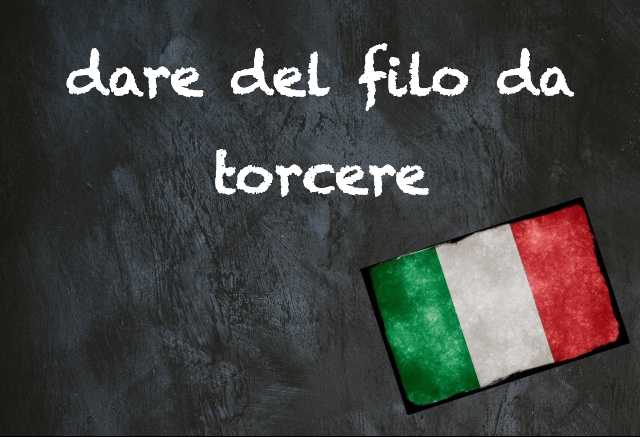Italian expression of the day: 'Dare del filo da torcere'

Don't let this Italian phrase give you a hard time.
If in English we talk about 'giving someone a hard time', Italians have an altogether more poetic way of getting the same idea across.
Dare (del) filo da torcere - literally, 'to give a thread to twist' - means to give someone a run for their money, to make their life difficult, to put up a fight, or to generally get on their case.
"...davamo per scontato che se fossimo tornate senza braccialetto ci avrebbe dato filo da torcere."
"...we took it as read that if we returned without the bracelet she'd give us a hard time."
(From Elena Ferrante's 'The Lying Lives of Adults')
Hanno dato del filo da torcere all'altra squadra.
They put up a good fight against the other team.
Vediamo se riusciamo a dare del filo da torcere a questo truffatore.
Let's see if we can't give this scammer a run for his money.

Note the del is optional - it can be left out without changing the meaning.
So where did this phrase originate?
Back when fabric was made entirely by hand, the fibres first had to be spun into yarn, which involved torcitura, or twisting - without which the thread would be too weak to form properly.
This process was notoriously difficult, as it was very easy to break the yarn as you were twisting it into being.
One source even claims the women who performed the task had to keep their hands continually moisturised and would have them checked regularly by supervisors for smoothness, as rough skin alone could tear the fibres.
Because the job was such an arduous and complicated one, over time 'giving someone a thread to twist' came to mean making things very difficult for them.
It's a phrase that works by degrees; for example, you can give someone molto filo da torcere (a very hard time - literally, a lot of thread to twist), or un po' di filo da torcere (a bit of a hard time/ a bit of thread to twist).
La professoressa le ha dato molto filo da torcere quando è arrivata in ritardo l'altro giorno.
The teacher gave her a really hard time when she arrived late the other day.
Che ne dici di dare un po' di filo da torcere a questi cretini?
How about giving these jerks a bit of a run for their money?
Filo da torcere is also, incidentally, the Italian title of the film Every Which Way but Loose, a 1978 offbeat comedy starring Clint Eastwood that became a surprise commercial hit despite being critically panned.
Now you've mastered this phrase, see if you can't give the best student in your Italian language class a run for their money the next time you meet.
Do you have an Italian word you’d like us to feature? If so, please email us with your suggestion.
Comments
See Also
If in English we talk about 'giving someone a hard time', Italians have an altogether more poetic way of getting the same idea across.
Dare (del) filo da torcere - literally, 'to give a thread to twist' - means to give someone a run for their money, to make their life difficult, to put up a fight, or to generally get on their case.
"...davamo per scontato che se fossimo tornate senza braccialetto ci avrebbe dato filo da torcere."
"...we took it as read that if we returned without the bracelet she'd give us a hard time."
(From Elena Ferrante's 'The Lying Lives of Adults')
Hanno dato del filo da torcere all'altra squadra.
They put up a good fight against the other team.
Vediamo se riusciamo a dare del filo da torcere a questo truffatore.
Let's see if we can't give this scammer a run for his money.

Note the del is optional - it can be left out without changing the meaning.
So where did this phrase originate?
Back when fabric was made entirely by hand, the fibres first had to be spun into yarn, which involved torcitura, or twisting - without which the thread would be too weak to form properly.
This process was notoriously difficult, as it was very easy to break the yarn as you were twisting it into being.
One source even claims the women who performed the task had to keep their hands continually moisturised and would have them checked regularly by supervisors for smoothness, as rough skin alone could tear the fibres.
Because the job was such an arduous and complicated one, over time 'giving someone a thread to twist' came to mean making things very difficult for them.
It's a phrase that works by degrees; for example, you can give someone molto filo da torcere (a very hard time - literally, a lot of thread to twist), or un po' di filo da torcere (a bit of a hard time/ a bit of thread to twist).
La professoressa le ha dato molto filo da torcere quando è arrivata in ritardo l'altro giorno.
The teacher gave her a really hard time when she arrived late the other day.
Che ne dici di dare un po' di filo da torcere a questi cretini?
How about giving these jerks a bit of a run for their money?
Filo da torcere is also, incidentally, the Italian title of the film Every Which Way but Loose, a 1978 offbeat comedy starring Clint Eastwood that became a surprise commercial hit despite being critically panned.
Now you've mastered this phrase, see if you can't give the best student in your Italian language class a run for their money the next time you meet.
Do you have an Italian word you’d like us to feature? If so, please email us with your suggestion.

Join the conversation in our comments section below. Share your own views and experience and if you have a question or suggestion for our journalists then email us at [email protected].
Please keep comments civil, constructive and on topic – and make sure to read our terms of use before getting involved.
Please log in here to leave a comment.